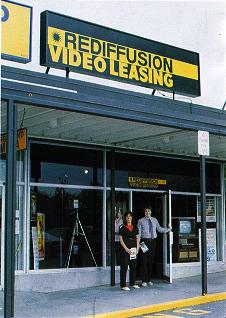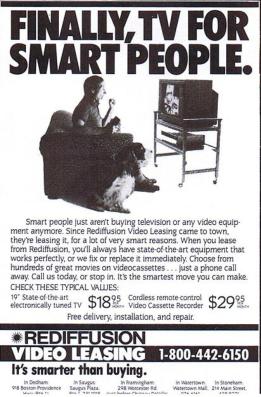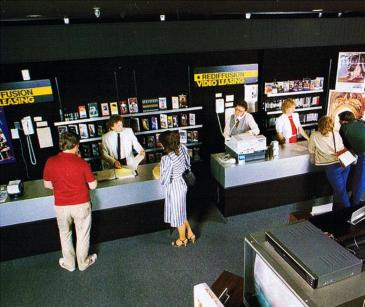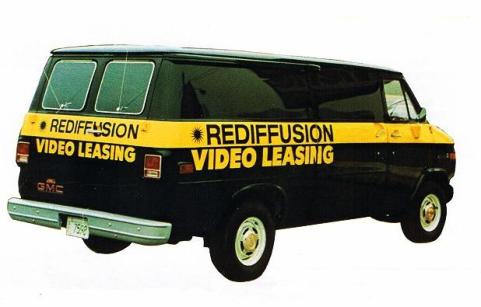Disclaimer
The information on this page is for interest purposes only and not neccessarily factual and correct. No claim is made to the rights.

VIDEO LEASING
REDIFFUSION
1 - 800 - 442 - 6150

REDIFFUSION Video Leasing Inc.
BOSTON MA. USA

In 1982 Rediffusion opened five TV and VCR rental shops in Boston, USA — and if the
pilot project was a success, The plan was to expand further in the States.
It was the first time the company has tried the rental business in America and following assistance from a management consultants in late 1981,” he it was decided to move ahead quickly to start a ‘pilot project’.
“The only competition in Boston at that time was from Rentacolor, although very few people
rented TV's at that time.
As for VCRs, research showed that only 4% of people owned a recorder. So in November 1982, Rediffusion Video Leasing Inc was formed with a brief to get five shops off and running by April
that year. Stores were established in: Dedham, Saugus, Framlingham, Watertown and Stoneham.
Each site had a manager, two sales staff, a technician and a credit representative, and each store was run as a profit centre in its own right, responsible for selling, servicing
and accounting.
Shopping patterns were very different in the US and the American customer had to be
approached with caution. There was no significant history of renting. Where renting did exist, it was looked down upon as the poor man’s option.
The new company decided to tackle the problem head-on — by aiming for high income customers and the word "leasing” was chosen as it reflected more in the way of an up-market image.
The plan was to target a base of customers who wanted to lease, rather than get those who had to rent because they could not afford to buy.
The sales team had hoped to entice their rich customers in a variety of ways. First, Rediffusion signed an agreement with Mitsubishi to supply nearly all the product. Mitsubishi already had a quality brand image in the States, being a large company with only a small market share they
were eager to increase.The range included 12 conventional TV sets, two component systems,
three projection TVs, five video recorders and two camera systems.
Also on offer were 200 films on cassette for hire at $1 a night to leasing customers and $2 to
the general public.
The stores are fitted out in an up-market ‘high tech’ style, mainly black inside with spotlights
to give them a clean, space-age feel.
To complete the classy picture, Video Leasing Inc. ran a big advertising campaign with the
tag line “Finally, TV for Smart People.” to persuade the typical American away from his
traditional desire to own. It ran on television, in the TV and radio listings magazines, in the daily press and in a ‘mail drop’. Potential customers were told to ring a special ‘toll-free’ phone number given on the ad.
Americans do much of their business on the phone, but that had one entirely unexpected result. Because of satellite and cable TV, the ads were seen in Dallas, Texas, and unfortunately customers started ringing Rediffusion Simulation Inc. in Arlington on their toll-free service number asking to lease TVs!
In the first few weeks, the advertising brought over 400 subscribers to Video Leasing — but it
was less than it might have been, for customers were stringently checked for credit rating.
One of the main reasons Boston was selected to "pilot" the scheme in the USA was that this
was a very Conservative city and the rational was that if the attitudes to renting could be changed here, it could be changed anywhere.



The Conquest of America
Stores were opened in five of the eight shopping
areas that surrounded Boston. This one was at Saugus.
The Advertising Campaign ran on television, in the press and through "mail drops'
Each shop was a profit centre isn it's own right, responsible for it's overall performance. Pictured is the Watertown store.
Delivery Vehicle








